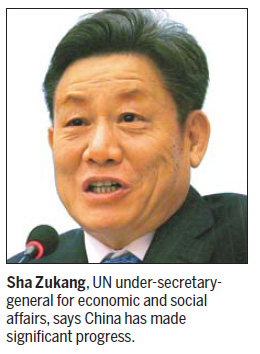Focus
'Collective efforts' matter in achieving targets
(China Daily)
Updated: 2010-09-22 08:12
 |
Large Medium Small |

Editor's note: With the 2015 deadline of achieving the Millennium Development Goals (MDGs) approaching fast, the debate over the goals has never been hotter. China Daily reporter Zhang Yuwei talks with Sha Zukang, a Chinese diplomat who is UN under-secretary-general for economic and social affairs.
With five years left, what is your assessment on the current status of the Millennium Development Goals? In particular, where does China stand in achieving the goals by 2015?
Overall progress has been made toward all goals, and remarkable gains have been achieved by many countries, even some of the poorest ones.
Although the world is still grappling with the aftershocks of multiple crises, we have plenty of evidence that the goals are still achievable.
However, progress has been uneven and old and new challenges threaten to further slow progress in some areas or even undo successes achieved so far.
In addition to remarkable successes in poverty reduction, China has made progress in achieving other MDG targets, succeeding for instance in drastically reducing the levels of child under nourishment to only 7 percent in 2005.
Women have wide access to reproductive health services, and maternal mortality is relatively low, estimated at 45 deaths per 100,000 live births in 2005. Close to 98 percent of births are attended by skilled health personnel, and adolescent fertility is among the lowest in the world, at only 4.6 births per 1,000 women aged 15 to 19.
The country has also made progress in addressing the needs of its rural population, although much remains to be done. The proportion of people in rural areas with access to safe sanitation increased by more than one third between 1990 and 2008 - from 38 percent to 52 percent.
However, there is still a long way to go to fully achieve all targets under the MDGs. Reaching rural populations and most disadvantaged groups of the population will be a priority, especially in this unfavorable economic climate.
The UN data since 1990 shows that China is the fastest in reducing poverty in the world, especially in rural areas. The recent MDG report also says poverty rates in China are expected to fall to around 5 percent. Do you see China taking the lead to realize the goals by 2015?
At the beginning of the 1990s, the benchmark year to monitor progress toward the MDGs, East Asia had the highest incidence of poverty in the world. Thanks largely to China's economic growth and anti-poverty measures, the region has been leading the global downward trend. A total of 475 million people in China have since been lifted from extreme poverty.
The country has also made progress in most of the other MDGs. However, issues of inequalities and large disparities between rural and urban population will need to be addressed for the MDGs to be fully achieved.
The environmental target has been a weakness for China in realizing the MDGs. How do you think China can address this to catch up?
A: China has made significant progress in meeting the MDG environmental targets - in improving access to water and sanitation and in protecting biological diversity, etc. Furthermore, China has made great strides in reforestation, in renewable energy and in energy efficiency.
However, China does face tremendous challenges in environmental protection as it has 20 percent of the world's population but only 9 percent of the world's arable land, and its economy is undergoing rapid transformation. The challenge is especially daunting in reducing wastes and emissions.
But I'm confident that China will succeed in addressing the environmental challenges. The Chinese government has accorded priority attention to protecting ecosystems and reducing emissions. China is embarking on a journey to transform its economic structure, investing in a green economy and promoting a new paradigm of growth based on sustainable development.
Some reports indicate that there has been a gender gap in achieving the MDGs in China. How can China work to reduce this gap?
I don't agree with that assessment. China has long demonstrated its strong commitment to gender issues. The Chinese government attaches great importance to women's development and has made the achievement of equality between men and women a basic national policy. Over the 30 years of reform and opening-up, China has achieved remarkable economic growth and overall social progress. This has helped safeguard equal rights and opportunities for women.
With the recent food, energy, climate, and economic and financial crises, how can developing and least developed countries catch up on the goals?
The ongoing multiple crises have affected both developed and developing countries, and have caused setbacks on all the MDGs. Therefore, the global partnership for development between developed and developing countries as called for in MDG 8 is more significant than ever before. But the international community has been lacking in the commitments made to provide more aid, a fairer trading system for developing countries and a comprehensive solution to the debt problem.
The shortfall in delivering commitments to increase official development assistance (ODA) will be $20 billion this year, while to keep the promises made, the annual flows of ODA should have increased by about $150 billion by the year 2015.
At the same time, developing countries should also make renewed efforts to achieve the MDGs. As the second character of the Chinese word for crisis implies: A time of crisis is also a time of opportunity. This is the time for developing countries to invest in key areas which will not only help them advance their efforts to reach the MDGs but will also fortify economic growth and a more robust and quicker recovery.
What do you think are the biggest lessons learned in achieving the MDGs so far? Are there any specific recommendations you would like to put forward?
The most important lesson learned is that collective efforts really matter. Five years from the deadline, these efforts towards achieving the MDGs have made inroads in many areas. Many countries are moving forward, including some of the poorest. Despite significant setbacks due to the financial, food and energy crises, the developing world as a whole remains on track to achieve the poverty reduction target by 2015. This is largely due to rapid economic growth in China and India.
Yet, achieving all the MDGs will require increased attention to those most vulnerable. The critical question is how to transform the pace of change from what we have seen over the last decade into dramatically faster progress. Policies and interventions will be needed to eliminate the persistent inequalities between the rich and poor.
|
An old man from Dawa village, Lai'an county in Anhui province learns how to use a fan donated by Lai'an Power Supply Company. Xu Bin / for China Daily |
(China Daily 09/22/2010 page6)
